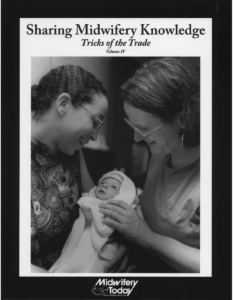
International Midwifery
Midwifery Today E-News, September 13, 2017 • Volume 19, Issue 19
Subscribe to E-News
“Will having a newborn distract from the time we have together?” she asked. “Don’t you think saying goodbye to your child will make your death more painful?”
“Wouldn’t it be great if it did?” I said.
Lucy and I both felt that life wasn’t about avoiding suffering. Years ago, it had occurred to me that Darwin and Nietzsche agreed on one thing: the defining characteristic of the organism is striving. Describing life otherwise was like painting a tiger without stripes. After so many years of living with death, I’d come to understand that the easiest death wasn’t necessarily the best. We talked it over. Our families gave their blessing. We decided to have a child. We would carry on living, instead of dying.
―Paul Kalanithi, When Breath Becomes Air
Inside this issue:
- Jan’s Corner – Birth is a Human Rights Issue
- Country Contact Q&A: Improvement of Care in the Past Five Years
- Website Highlight: A Human Rights Approach to Optimal Maternity Care
This issue is brought to you by:
See how birth should be.
 “nacer con amor cambia el mundo,” a 4-disc DVD set from La Primavera Maternidad Clinica, gives you over 7 hours of birth footage. Jan Tritten says: “The births shown in this DVD set are the most beautiful births I have ever seen on film. They are so gentle and work so well with nature, they show how birth should be conducted in a very gentle, hands-off kind of way.” The set is in Spanish only, but our shared humanity makes them completely relatable. Order your copy today.
“nacer con amor cambia el mundo,” a 4-disc DVD set from La Primavera Maternidad Clinica, gives you over 7 hours of birth footage. Jan Tritten says: “The births shown in this DVD set are the most beautiful births I have ever seen on film. They are so gentle and work so well with nature, they show how birth should be conducted in a very gentle, hands-off kind of way.” The set is in Spanish only, but our shared humanity makes them completely relatable. Order your copy today.
Jan’s Corner
Birth is a Human Rights Issue
I just learned that another obstetrician friend lost his license because of an unexpected homebirth outcome. He is from Brazil where there is/was a strong movement toward humane birth, but also the second highest caesarean rate in the world—just after China. There is a continuing movement against good doctors and midwives going on throughout the world. This is happening at a time when we are learning more about how important birth is to the lifetime health of the mother and, especially, the baby. The people who are being stopped from practicing are generally those with the best outcomes.
At Midwifery Today we try to make people aware that birth is a human rights issue. We have had conferences, E-news issues and an issue of our magazine dedicated to that theme. I believe we are suffering an ongoing crisis in birth care around the world. An example of that crisis is great doctors and midwives being stopped in their efforts to help moms have the best birth possible.
Is there hope? I still believe there is. What I have noticed in my more than four decades in midwifery and birth is that there a lot more of us who understand the importance of how childbirth happens. Robbie Davis-Floyd tells us that when 20% of the people are in support of an issue, we have reached critical mass—where one person tells many others about it. Let’s just hope that with all of us working toward optimal birth for every motherbaby, we will change the world. Please keep up your hard work in birth change wherever and however you work. With social media there are many more ways to communicate the message of good birth! With your work and mine we will change the world one birth, one person at a time.
—Jan Tritten, Editor-in-Chief
Jan Tritten is the founder, editor-in-chief and mother of Midwifery Today magazine. She became a midwife in 1977 after the amazing homebirth of her second daughter. Her mission is to make loving midwifery care the norm for birthing women and their babies throughout the world. Meet Jan at our conferences around the world, or join her online, as she works to transform birth practices around the world.
Midwifery Today on Facebook
Midwifery Education: Caring and Sharing (Facebook)
“Trust, Intimacy and Love—The Chemistry of Connection”
 This is the theme of our conference in Helsinki, Finland, this October. What a great opportunity to refresh and reinvigorate yourself as you discover new ideas, new techniques and meet midwives from around the world! Only walk-in registrations are now being accepted.
This is the theme of our conference in Helsinki, Finland, this October. What a great opportunity to refresh and reinvigorate yourself as you discover new ideas, new techniques and meet midwives from around the world! Only walk-in registrations are now being accepted.
Photo by Lynsey Stone
Attend a mini-conference in Troutdale, Oregon, on November 10!
 You will learn from classes such as “Shoulder Dystocia” with Gail Hart, “Our Eyes and Non-verbal Communication” with Eneyda Spradlin-Ramos and “When the Healer Is Healing, Too” with Maryl Smith. For the lowest price, be sure to register by Oct. 2. Go here to register and for more information.
You will learn from classes such as “Shoulder Dystocia” with Gail Hart, “Our Eyes and Non-verbal Communication” with Eneyda Spradlin-Ramos and “When the Healer Is Healing, Too” with Maryl Smith. For the lowest price, be sure to register by Oct. 2. Go here to register and for more information.
Photo by Shea Hardy Baker
Follow Your Passion: Become a Nurse-Midwife
 Are you interested in a career as a Certified Nurse-Midwife? Frontier Nursing University offers a Master of Science in Nursing program where coursework is completed online and your clinical experience in your own community. If you are a registered nurse with an associate degree in nursing or a bachelor’s degree, get in touch with one of our admissions counselors today.
Are you interested in a career as a Certified Nurse-Midwife? Frontier Nursing University offers a Master of Science in Nursing program where coursework is completed online and your clinical experience in your own community. If you are a registered nurse with an associate degree in nursing or a bachelor’s degree, get in touch with one of our admissions counselors today.
Country Contact Q&A
Editor’s Note: Midwifery Today is interested in promoting international networking among childbirth practitioners. Our goal is to strengthen the international community by establishing a country contact in every country of the world. If you would like to become a country contact, please e-mail Jan Tritten.
For this international edition of E-News, we asked Midwifery Today’s country contacts the following questions:
Do you believe that care of birthing women and babies has improved or worsened in your country over the past five years? Why?
Belize
I hope it has improved, but I’m still hearing stories of bad births. Many are trying to make changes, and change is happening—at the speed of a melting glacier! So we keep on. I use my Facebook, for mostly gentle birth promotion and ideas for better health, and then try to get the young folk following me. I also forward evidence-based care ideas to all in power.
I am told by medical personnel that all hospitals here are baby-friendly-certified; I do not see it or know stories of births from consumers that this is so. We still have a high c-section rate (50%), episiotomies at practically every birth (for sure on first-time moms) and lithotomy position for birth (worst possible position). There is some improvement with having family members attend the birth. Not bad for 11 years of trying!
I am getting more requests for my services here, so word is spreading that there is a better way—I just need more help! Childbirth educators are the answer—as we midwives all know. The only way for great change is from consumers! One doctor here has given me a room in his clinic for waterbirths; that my biggest victory!
—Gail Johnson
Uganda
There has been improvement because of interventions such as helping babies breathe, training of health workers in emergency obstetric and newborn care (EmONC) and improvement in the referral system.
—Kezaabu Edwidge
Philippines
I can say that care of birthing women and babies in the Philippines somehow made an improvement with the following contributory factors:
- The establishment of birthing centers owned and managed by midwives, who employ obstetricians (on-call).
- The continuous search for professional growth and development of midwives by enhancing their skills through training results in an efficient and effective quality of care.
- The coordination of birthing center with hospital facilities for referral was well-established.
- Maternity care package benefit received by birthing center from Philhealth helps sustain the provision of quality care among birthing women and their babies.
—Cecilia Banca Santos
Bahamas
I do not believe that the care of birthing women has improved in the Commonwealth of the Bahamas in the past five years. The reasons for this are many:
- The model of medical practice is patriarchal. The physician is not to be challenged or questioned.
- There is no accountability for birth outcomes. There is no scrutiny of the system or review of existing protocols or physician practice.
- There is no Patient’s Bill of Rights.
- Consent is coerced rather than informed.
- The midwives do not have autonomy. They are employed by the Public Hospitals Authority of the Ministry of Health. They work more as physician assistants than they do as autonomous midwives.
- The prevalence of induced labors, unnecessareans and outdated practices (NPO, enemas, in bed for labor, lack of privacy, no continuous labor support, no STS with the newborn, outdated breastfeeding information and breastfeeding support and so much more) are evidence of the lack of respect for childbearing women.
- Birth doulas are barred from hospital support of childbearing women.
- General apathy that goes unchecked because no one is held accountable for their actions.
—Mary DeLashmutt
Turkey
I believe that care of birthıng women and babies has improved over past years. We worked for it, educating a lot of midwıves on waterbirth and drug-free pain relief techniques (aromatherapy, massage, etc.); so midwives have started to do what they learn. Now we hear about good birth stories with no drugs. Our health government has started to believe that midwives are important, if they want to lower the c-section rate. Now we are pushing them to open new midwifery schools and provide good midwifery education. A lot of private and government hospitals are now offering birth classes where low-income women—in big cities and poor villages—can come and learn how to birth like they imagined. This is so exciting and incredible. Going to birth classes is no longer a luxury; it is a necessity.
Midwifery Today has opened a lot of doors for us and we are thankful for the speakers who came to Turkey and taught us. Also some women have contacted wıth me through the Country Contact pages, and we try to support them.
—Esra Çömezoğlu
Portugal
I see good changes in Portugal. More and more women want to give birth outside hospital and more and more midwives want to work outside hospital. Women are more aware about their choices and choose hospitals with the highest possibility to have a normal birth without interventions. More hospitals have waterbirth and the percentage of c-section is falling, although there are women who see this as negative. This is because of economic reasons and they fear more cerebral palsy.
The law in Portugal says you can have at least one person available for support at birth, but many hospitals have said it can be only one person. Now access for doulas and midwives is less difficult.
Obstetricians and pediatricians still have difficulty accepting birth plans, so intimidation still occurs. Cord-clamping still occurs before the placenta is born and they do not respect the first hour after birth, but we see change for the better, due to access to the Internet and more people speaking English.
—Mary C. Zwart
Make sure you get the whole story.
 Midwifery Today E-News is only a sample of what you’ll find in Midwifery Today magazine. Subscribe and you’ll receive a quarterly print publication filled with in-depth articles, birth stories from around the world, stunning birth photography, news, reviews and more. Subscribe here.
Midwifery Today E-News is only a sample of what you’ll find in Midwifery Today magazine. Subscribe and you’ll receive a quarterly print publication filled with in-depth articles, birth stories from around the world, stunning birth photography, news, reviews and more. Subscribe here.
Website highlight
The International MotherBaby Childbirth Initiative: A Human Rights Approach to Optimal Maternity Care
“Before entering the hospital we have first to decide how much money we have to give. We are not admitted unless we first give them money. When the woman enters into the hospital, the doctor behaves rudely with her. Sometimes nurses beat her. They do not let close and affectionate relatives, who came from home with us, stand at our side. They themselves do not stay near us. We wish that somebody [would] hold us by the waist when pains come, but they do not do it. We have not even to moan, lest they talk sarcastically, make fun of us, which is very [hurtful] still we have to bear. If we moan too much, they may sometimes slap us. If we happen to say something, they retort by asking us whether they had invited us to come. ‘Why have you come then? You may go back home!’ In hospital, we have to lie down on the bed to get delivered. In the hospital they excise the vaginal wall with a blade for enlarging it. The body gets damaged unnecessarily. After delivery we feel terribly hungry, but we consider ourselves lucky if we get a cup of tea.” Read more.
Featured Products
Expert midwives share their tricks
 Sharing Midwifery Knowledge is packed with information that can expand your personal bag of tricks, enhance your education and encourage a natural approach to safe childbearing. Topics include Nutrition and Herbs, Natural Alternatives to Drugs and Suturing, The Dangers of Ultrasound and Premature Rupture of Membranes. Order your copy here.
Sharing Midwifery Knowledge is packed with information that can expand your personal bag of tricks, enhance your education and encourage a natural approach to safe childbearing. Topics include Nutrition and Herbs, Natural Alternatives to Drugs and Suturing, The Dangers of Ultrasound and Premature Rupture of Membranes. Order your copy here.
Get practical information about how to have a natural birth in any setting
 The Down to Earth Birth Book has information on herbs, nutrition, exercise, yoga, massage, breathing for birth, the stages of labor, waterbirth, breech birth, mastitis, foods for early breastfeeding and much more. You will also find diagrams, illustrations and over 90 color and black and white photos. This is a book you will return to time and again for information on birth preparation, as an in-the-moment birth guide, and as a reference for after the birth. Learn more.
The Down to Earth Birth Book has information on herbs, nutrition, exercise, yoga, massage, breathing for birth, the stages of labor, waterbirth, breech birth, mastitis, foods for early breastfeeding and much more. You will also find diagrams, illustrations and over 90 color and black and white photos. This is a book you will return to time and again for information on birth preparation, as an in-the-moment birth guide, and as a reference for after the birth. Learn more.





















